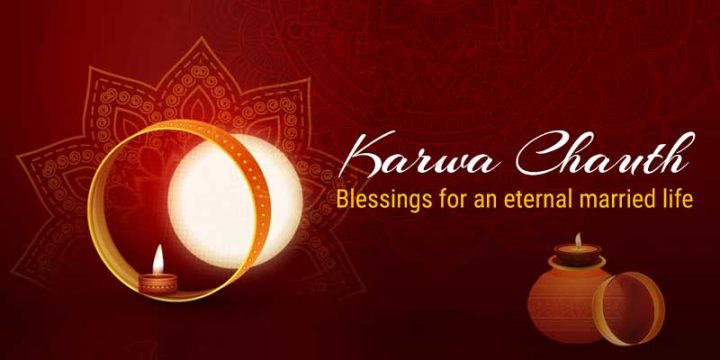Karwa Chauth –Blessings for an eternal married life
A country filled with amazing customs, traditions, cultures, and festivals, with each festival having its own vibrancy and significance, India is a land of multitudes. While some festivals are celebrated to welcome prosperity and good wishes, some for divine blessings, and some to commemorate national spirit, seasons, and beliefs, Indians need a reason to celebrate life.
The Hindu customs are filled with various festivals of religious importance as well as to ensure the protection of marital prosperity and wellbeing of offsprings. Divine blessings can be gained by observing a vrat to show your faith.
Celebrated by married women in the Hindu religion, Karwa Chauth is a significant one-day festival where married women observe a strict fast from sunrise to moonrise, praying for the safety, wellbeing, and long life of their husbands. Karwa Chauth signifies the eternal bond shared between a husband and wife and is one of the most loved and
popular festivals in India. Karwa Chauth has been commemorated in most Bollywood films raising its popularity not just among North Indians but among South Indians too. Karwa Chauth is majorly celebrated in North Indian states, while it is observed in a few South Indian states.
In the Hindu belief, Karwa Chauth Vrat is observed on Chaturthi Tithi, the fourth day of
Krishna Paksha during the Hindu month of Karthik as per the Purnimanta calendar, coinciding in the month of October-November according to the Gregorian calendar. In the states of Maharashtra, Gujarat, and southern India, it is observed as per the Amanta calendar and is observed during the Hindu month of Ashwin. Karwa Chauth fast coincides with
Sankashti Chaturthi, which is observed for Lord Ganesha.
Married women observe the fasting and rituals of Karwa Chauth for the long life of their husbands. They worship Lord Shiva and his family, including Lord Ganesha, and conclude the fast only after sighting the moon and making arghya or offerings to the moon. Karwa Chauth fast is also known as Nirjala fast as it is a strict fast observed without taking food or even a drop of water until the sighting of the moon.
Get Your Free Marriage Predictions
When is Karwa Chauth 2022?
In 2022, Karwa Chauth will be observed on Thursday, October 13, 2022.
- Sunrise Timing: 06:21 AM on 13 October 2022
- Upavasa Timing: 06:21 AM – 08:09 PM on October 13, 2022
- Sunset Timing: 05:54 PM on 13 October 2022
- Moonrise Timing: 08:09 PM on 13 October 2022
- Puja Muhurat Timing: 04:08 PM – 05:50 PM on October 13, 2022
- Chaturthi Tithi Begins 01:59 AM on October 13, 2022
- Chaturthi Tithi Ends 03:08 AM on October 14, 2022
Everything You Should Know
The biggest aspect about Karwa Chauth is this one-day Nirjala fast observed by married women, newly married or betrothed girls who pray for the long lives of their husbands or their fiancés. However, it is vital that one should perform the Karwa Chauth rituals in the correct manner to get the blessings.
Sargi -Love from Mother-in-law to Daughter-in Law
Karwa Chauth begins by consuming the sargi gifted by the mother-in-law to her daughter-in-law. The sargi consists of a plate containing earthen pots, sweets made from vermicelli, fruits, matthri, and dry fruits. This food should be eaten before sunrise to begin the Nirjala fast so that it gives the energy to observe the fast.
Puja items for Karwa Chauth
The puja items that are mandatorily required for the puja are small Karwa lamps, earthen pots, matthri, Mehendi, and the puja thali. Women apply beautiful Mehendi designs on their hands as this signifies prosperity, luck, and eternal marital bliss
Dressing for Karwa Chauth
Most women dress like a bride on Karwa Chauth, in memory of their wedding days. Traditionally, red is the colour chosen for their attire as red dresses are worn as bridals; however, there is no hard and fast rule to stick to this colour code. However, women can wear the clothing of their choice and comfort, since it is a day filled with devotion and fasting.
Karwa Chauth Fast
Women consume sargi after a bath before sunrise, and once sunrises, the upavasa begins. Women do not consume any food or even water throughout the entire day. This is to appease Karwa matha and gain her blessings for their husbands’ long lives and marital happiness.
Baya –Love from Daughter-in-law to Mother-in-law
Similar to the sargi, Baya is a gift from the daughter-in-law to her mother-in-law. The Bays is prepared in a large thali (plate) containing a blend of gifts, savories like matthri, sweets like halwa and puri.
Reciting the vrat katha
The women observing the Karwa Chauth vrat recite and listen to the Karwa Chauth Vrat Katha, which is read by the elderly women folk, mainly the mother-in-law or elder sister-in-law. Women sit around in a circle, and an earthen pot is kept in the center of the ring. Puja thali is then prepared with all the puja items and karwa, and is then exchanged in a pattern among the women gathered in a circle for the puja.
Karwa Chauth Puja Preparation
During this festival, women light diyas or small lamps, and water is poured into a karwa which is a small earthen pot. The diyas are placed on a sieve which is covered by a transparent cloth or dupatta. Upon moonrise, women carry these items to the designated spot or terraces where the moon is clearly visible.
Arghya to the Moon
When the moon comes up in the sky and becomes clearly visible, the lady initiates the puja ritual of offering water to the moon. This offering is known as “Arghya.” This is done so to seek blessing from the lunar deity – Chandra. According to Hindu mythology, observing a strict fast and prayer would help the woman defeat the Lord of Death, Yamaraj, and deter him from taking her husband away from her. The women then observe the reflection of the moon in the pot of water through the sieve
Breaking the fast
As part of the tradition, after sighting the reflection of the moon through the sieve, the women then turn towards their husbands and fiancés and look at them through the sieve, at the same time praying for the long life of their husbands. When a woman performs the Karwa Chauth puja and sees her husband through the sieve, it is believed that all negative emotions are filtered and thrown away through the sieve. The husband then helps his wife break the fast by offering her a sip of water and a sweet, thus concluding the fast. The women then partake in the scrumptious feast prepared for the occasion.
Karwa Chauth Vrat Katha
To fulfill the Karwa Chauth vrat, it is imperative that women must recite to each other and listen to the Karwa Chauth vrat Katha. Generally, there are different versions of Karwa Chauth Vrat Katha, which is read out in different regions. The main vrat Katha that is read out is given below.
The tale of Veeravati:
There once lived a beautiful girl named Veeravati. She was the only daughter of a wealthy merchant who had seven sons. The seven brothers doted on their sister and loved her very much. Veeravati was later married to a young Brahman who was traveling for work. On one Karwa Chauth, she visited her parents’ house and observed the Karwa Chauth strictly without consuming a drop of water.
She waited eagerly for the moonrise as she started becoming weak and exhausted from the fast but refused to break her fast without sighting the moon. The brothers were pained to see their sister suffering, and they hung a mirror on a Peepal tree, making it look like the moon in the sky. They then called out to Veeravati, who, believing her brothers, broke her fast after offering prayers to the fake moon. The moment she broke her fast, she received the news of her husband’s death. Veeravati was inconsolable. Her sister-in-law informed her of the trick by her brothers, which led to the unfortunate events.
Veeravati then kept a strict Nirjala fast on all Chaturthi throughout the year with complete devotion and dedication praying to Lord Ganesha. The following year during Karwa Chauth, she observed the fast with true devotion and completed the ritual by offering arghya to the moon and saw her husband’s reflection through the sieve. Seeing her dedication, Yamaraj restored the life of her husband, and she lived happily ever after.
From the Tales of Mahabharata:
It is mentioned that Draupadi also observed the Karwa Chauth fast for her husbands. Once Arjuna, whom Draupadi loved the most, went to Nilgiri Mountains for offer penance. In his absence, the rest of the brothers faced a lot of challenges. Seeing all her husbands in distress, Draupadi sought the advice of Lord Krishna for overcoming the challenges. Lord Krishna narrated the story of Goddess Parvathi, who observed the Karwa Chauth fast rituals during a similar situation. Draupadi, too, observed the strict fast of Karwa Chauth and followed all traditions religiously. This helped the Pandavas to overcome all their challenges and gain victory.
Satyavan and Savitri:
When Yama, the god of death, took away Satyavan, Savitri begged Yama to grant back her husband’s life. However, Yama was adamant and took her husband away. Seeing this, Savitri stopped eating and drinking and followed Yama. Seeing Savitri’s persistence, Yama said to Savitri that she could ask for any other boon except for the life of her husband. Savitri, being a clever woman, asked Yama that she wished to be blessed with motherhood. Savitri was a devoted and loyal wife and would not commit adultery. Yama had no other option than to restore Satyavan’s life so that Savitri could fulfill her wish of bearing children.
The Story of Karwa:
Similar to Savitri, there once lived a woman named Karwa who loved her husband deeply and intensely. Her deep devotion and love for her husband gave her spiritual powers. Once while bathing in a river, her husband was attacked by a crocodile. Seeing her husband being attacked, the courageous Karwa bound the crocodile with cotton yarn and summoned Yama. Yama was afraid of being cursed by such a devoted wife, and so he sent the crocodile to hell and restored her husband’s life.
Significance of Karwa Chauth Vrat
One of the biggest occasions in the married lives of Hindu women, the Karwa Chauth vrat is of immense significance as observing this fast ensures the long life, wellbeing, and prosperity of their husbands. With rising commercialization, the popularity of this fast has become more prominent and grandiose in the country. This fast is of great prominence in North and Northwestern regions of India, where a considerable male population from these regions are engaged in the Indian Army and other defense services.
Hence women from these regions observe this fast for the safety and wellbeing of their husbands who are employed in the armed forces. The fast also coincides with the initiation of the Rabi crop season when wheat is sown in the fields. The women from the agricultural families fill the earthen pots or Karwa with wheat grains and offer prayers to the god for a bountiful Rabi season.
Nowadays, when traditions are being modernised, married women receive beautiful and expensive gifts from their husbands and in-laws on Karwa Chauth. This could include bangles, jewelry, Mehendi, lehenga choli, sarees, and other traditional offerings. This custom of gifting is a means to express their love for the women and strengthens the eternal bond of love between the husband and wife. Women feel pampered and loved while receiving gifts from their loved ones.
Another important fact is that Karwa Chauth marks the beginning of feasting and festivity of
Diwali, which is a major Hindu festival and is celebrated nine days after Karwa Chauth. The Karwa Chauth fast has thus become an occasion filled with celebrations and joy, with the entire household participating in the festivities.








